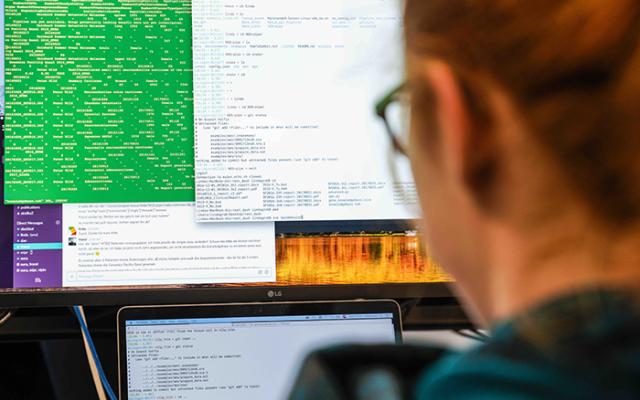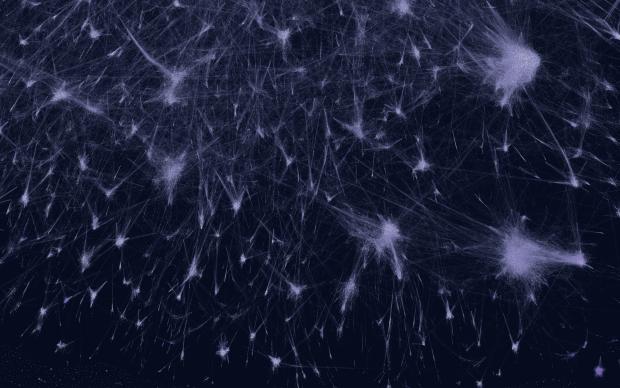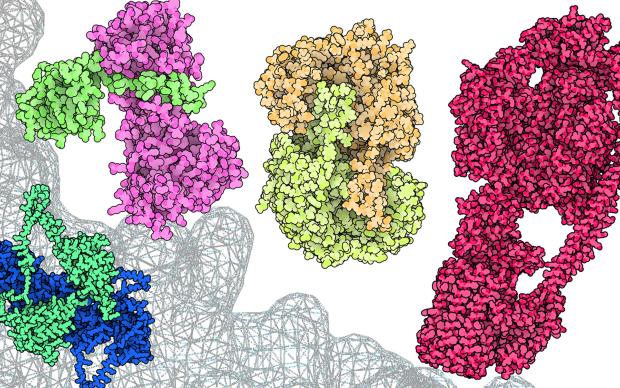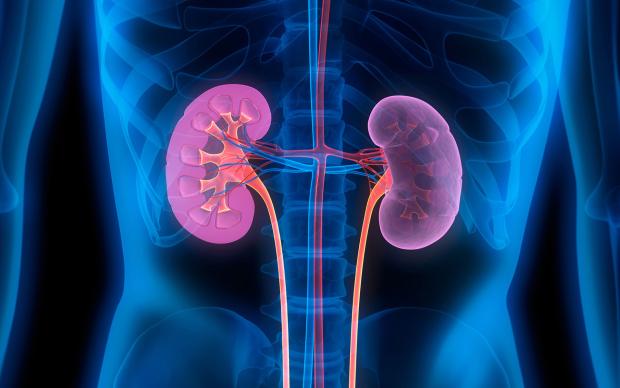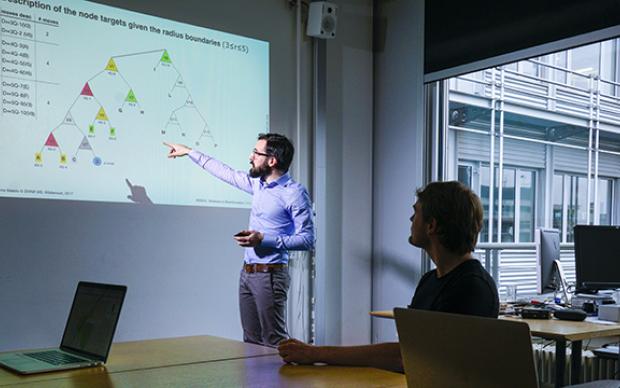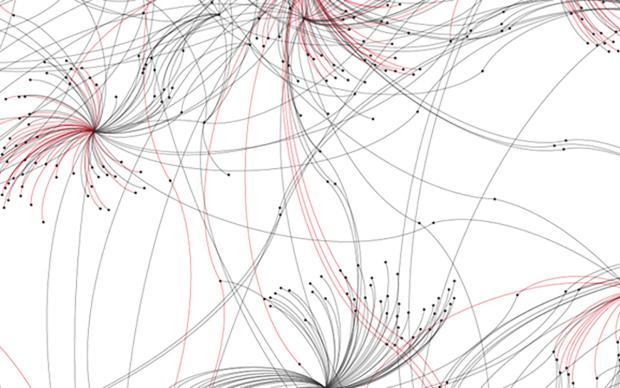Focus on the group's mission
The Swiss-Prot group, co-led by Alan Bridge and Paul Thomas, excels in generating machine-readable knowledge of biology from the ever-growing body of scientific publications. The team harnesses the power of deep learning methods to accelerate literature triage and data extraction, thus delivering the most accurate and comprehensive information to users in a timely manner.
Annual key figures
Over 150,000
resource citations in scientific publications
Over 180,000
resource mentions in patents
Over 8 million
resource users annually
Sources and user definitions: lens.org, Web of Science, PubMed, Google Analytics, Matomo
Enabling discoveries through renowned biodata resources
The expertly curated, interlinked knowledge resources developed by the group’s biocurators and software developers are internationally recognized for their fundamental importance to life-science research and innovation – and used in applications from bioremediation of contaminated soils to drug discovery and development.
- UniProtKB/Swiss-Prot is the most widely used protein information resource in the world, and recognized as a SIB Resource, ELIXIR Core Data Resource, and Global Core Data Resource.
- Rhea, a database of biochemical reactions, is recognized as a SIB Resource, ELIXIR Core Data Resource, and Global Core Data Resource.
- Gene Ontology (GO) is a key source of information on gene function and recognized as Global Core Data Resource.
- SwissLipids, a database of lipid structures and biological knowledge, is recognized as a SIB Resource.
- The HAMAP and PROSITE are widely used databases of protein families and domains.
- The widely used ENZYME database provides information on enzyme nomenclature.
- ViralZone provides information on all viral genus and families.
- SwissBioPics offers a library of interactive cell images.
The Swiss-Prot group also supports the custom development of tools and resources for researchers and clinicians.
See more about our biocuration and software development services
Supporting AI with machine-readable biological knowledge
Life science knowledgebases are also an essential part of the AI ecosystem. The collective biological knowledge they contain – in the form of molecular sequences and structures, biochemical pathways, and the relationships between these – can be used to train and fine-tune AI systems that reveal complex biological mechanisms and generate actionable insights.
Knowledgebases developed by the Swiss-Prot group have contributed to:
- the 2024 Nobel-winning AlphaFold model for predicting protein structure, which learned to identify relationships between amino acid sequences and 3D structures by analysing hundreds of millions of proteins in UniProt (see AI focus in the SIB Profile 2025);
- a Large Language Model (LLM) for improving mRNA vaccine delivery, which was trained using SwissLipids (source: Bioinformatics, 2024);
- an LLM to design new proteins with desirable functions, which was trained using the expertly curated UniProtKB/Swiss-Prot part of UniProt (source: Nature Biotechnology, 2023);
The group also developed a benchmarking dataset, EnzChemRED, to fine-tune LLMs for specialized data curation – which was recognized as a SIB Remarkable Output. The team is applying the dataset to guide biocuration efforts for the UniProt and Rhea knowledgebases.
- Sigrist CJA, Cuche BA, de Castro E, Coudert E, Redaschi N, Bridge A. The PROSITE database for protein families, domains, and sites. Nucleic Acids Res 2025:gkaf1188
- Castoe TA, Daly M, Jungo F, Kirchhoff KN, Koludarov I, Mackessy S, Macrander J, Mehr S, Modica MV, Sanchez EE, Zancolli G, Holford M. A Vision for VenomsBase: An Integrated Knowledgebase for the Study of Venoms and Their Applications. Integr Org Biol 2025;7(1):obaf026
- UniProt Consortium. UniProt: the Universal Protein Knowledgebase in 2025. Nucleic Acids Research, Volume 53, Issue D1, 6 January 2025, D609–D617, https://doi.org/10.1093/nar/gkae1010
- Bolleman J. et al. A large collection of bioinformatics question–query pairs over federated knowledge graphs: methodology and applications. Gigascience 2025 May 16;14:giaf045. doi: 10.1093/gigascience/giaf045
- Feuermann M. et al. A compendium of human gene functions derived from evolutionary modelling. Nature 640, 146–154 (2025). https://doi.org/10.1038/s41586-025-08592-0
- Blum M. et al. InterPro: the protein sequence classification resource in 2025. Nucleic Acids Research, Volume 53, Issue D1, 6 January 2025, Pages D444–D456, https://doi.org/10.1093/nar/gkae1082
- Feuermann M, Gaudet P. Interpreting Gene Ontology Annotations Derived from Sequence Homology Methods. Methods Mol Biol. 2024:2836:285-298. doi: 10.1007/978-1-0716-4007-4_15.
- Lai PT, Coudert E, Aimo L, Axelsen K, Breuza L, de Castro E, Feuermann M, Morgat A, Pourcel L, Pedruzzi I, Poux S, Redaschi N, Rivoire C, Sveshnikova A, Wei CH, Leaman R, Luo L, Lu Z, Bridge A. EnzChemRED, a rich enzyme chemistry relation extraction dataset. Sci Data 2024 Sep 9;11(1):982. doi: 10.1038/s41597-024-03835-7.
- Ross KE, Bastian FB, Buys M, Cook CE, D'Eustachio P, Harrison M, Hermjakob H, Li D, Lord P, Natale DA, Peters B, Sternberg PW, Su AI, Thakur M, Thomas PD, Bateman A, UniProt Consortium. Perspectives on tracking data reuse across biodata resources. Bioinformatics Advances, 25 Apr 2024, 4(1):vbae057. https://doi.org/10.1093/bioadv/vbae057.
- SIB Swiss Institute of Bioinformatics RDF Group Members. The SIB Swiss Institute of Bioinformatics Semantic Web of data. Nucleic Acids Res. 2024 Jan 5;52(D1):D44-D51. doi: 10.1093/nar/gkad902.
- Witting M, Malik A, Leach A, Bridge A, Aimo L, Conroy MJ, O'Donnell VB, Hoffmann N, Kopczynski D, Giacomoni F, Paulhe N, Gassiot AC, Poupin N, Jourdan F, Bertrand-Michel J. Challenges and perspectives for naming lipids in the context of lipidomics. Metabolomics. 2024 Jan 24;20(1):15. doi: 10.1007/s11306-023-02075-x.
- UniProt Consortium. UniProt: the Universal Protein Knowledgebase in 2025. Nucleic Acids Research. 2024 Nov;. DOI: 10.1093/nar/gkae1010.
- Bowler-Barnett EH, Fan J, Luo J, Magrane M, Martin MJ, Orchard S, UniProt Consortium. UniProt and Mass Spectrometry-Based Proteomics-A 2-Way Working Relationship. Mol Cell Proteomics. 2023 Aug;22(8):100591. doi: 10.1016/j.mcpro.2023.100591. Epub 2023 Jun 8. Review.
- Coudert E, Gehant S, de Castro E, Pozzato M, Baratin D, Neto T, Sigrist CJA, Redaschi N, Bridge A; UniProt Consortium. Annotation of biologically relevant ligands in UniProtKB using ChEBI. Bioinformatics. 2023 Jan 1;39(1):btac793. doi: 10.1093/bioinformatics/btac793.
- Gene Ontology Consortium. The Gene Ontology knowledgebase in 2023. Genetics. 2023 May 4;224(1):iyad031. doi: 10.1093/genetics/iyad031.
- Insana G, Ignatchenko A, Martin M, Bateman A, UniProt Consortium. MBDBMetrics: an online metrics tool to measure the impact of biological data resources. Bioinform Adv. 2023;3(1):vbad180. doi: 10.1093/bioadv/vbad180. eCollection 2023.
- Lussi YC, Magrane M, Martin MJ, Orchard S, UniProt Consortium. Searching and Navigating UniProt Databases. Curr Protoc. 2023 Mar;3(3):e700. doi: 10.1002/cpz1.700.
- Ni Z, Wölk M, Jukes G, Mendivelso Espinosa K, Ahrends R, Aimo L, Alvarez-Jarreta J, Andrews S, Andrews R, Bridge A, Clair GC, Conroy MJ, Fahy E, Gaud C, Goracci L, Hartler J, Hoffmann N, Kopczyinki D, Korf A, Lopez-Clavijo AF, Malik A, Ackerman JM, Molenaar MR, O'Donovan C, Pluskal T, Shevchenko A, Slenter D, Siuzdak G, Kutmon M, Tsugawa H, Willighagen EL, Xia J, O'Donnell VB, Fedorova M. Guiding the choice of informatics software and tools for lipidomics research applications. Nat Methods. 2023 Feb;20(2):193-204. doi: 10.1038/s41592-022-01710-0. Epub 2022 Dec 21.
- UniProt Consortium. UniProt: the Universal Protein Knowledgebase in 2023. Nucleic Acids Research. 2023 Jan;51(D1):D523-D531. DOI: 10.1093/nar/gkac1052.
- Yamada T, Maeda M, Nagai H, Salamin K, Chang Y-T, Guenova E, Feuermann M, Monod M. Two different types of tandem sequences mediate the overexpression of TinCYP51B in azole-resistant Trichophyton indotineae. Antimicrob Agents Chemother 2023 Nov 15;67(11):e0093323. doi: 10.1128/aac.00933-23. Epub 2023 Oct 12.
- Zaru R, Orchard S, UniProt Consortium. UniProt Tools: BLAST, Align, Peptide Search, and ID Mapping. Curr Protoc.2023 Mar;3(3):e697. doi: 10.1002/cpz1.697.
- Bansal P, Morgat A, Axelsen KB, Muthukrishnan V, Coudert E, Aimo L, Hyka-Nouspikel N, Gasteiger E, Kerhornou A, Neto TB, Pozzato M, Blatter MC, Ignatchenko A, Redaschi N, Bridge A. Rhea, the reaction knowledgebase in 2022. Nucleic Acids Res. 2022 Jan 7;50(D1):D693-D700. doi: 10.1093/nar/gkab1016.
- Le Mercier P, Bolleman J, de Castro E, Gasteiger E, Bansal P, Auchincloss AH, Boutet E, Breuza L, Casals-Casas C, Estreicher A, Feuermann M, Lieberherr D, Rivoire C, Pedruzzi I, Redaschi N, Bridge A. SwissBioPics-an interactive library of cell images for the visualization of subcellular location data. Database (Oxford). 2022 Apr 12:2022:baac026. doi: 10.1093/database/baac026.
- Paysan-Lafosse T, Blum M, Chuguransky S, Grego T, Pinto BL, Salazar GA, Bileschi ML, Bork P, Bridge A, Colwell L, Gough J, Haft DH, Letunić I, Marchler-Bauer A, Mi H, Natale DA, Orengo CA, Pandurangan AP, Rivoire C, Sigrist CJA, Sillitoe I, Thanki N, Thomas PD, Tosatto SCE, Wu CH, Bateman A. InterPro in 2022. Nucleic Acids Res. 2023 Jan 6;51(D1):D418-D427. doi: 10.1093/nar/gkac993.
- Yamada T, Yaguchi T, Maeda M, Alshahni MM, Salamin K, Guenova E, Feuermann M, Monod M. Gene Amplification of CYP51B: a New Mechanism of Resistance to Azole Compounds in Trichophyton indotineae. Antimicrob Agents Chemother. 2022 Jun 21;66(6):e0005922. doi: 10.1128/aac.00059-22. Epub 2022 May 12.
- Feuermann M, Boutet E, Morgat A, Axelsen KB, Bansal P, Bolleman J, de Castro E, Coudert E, Gasteiger E, Géhant S, Lieberherr D, Lombardot T, Neto TB, Pedruzzi I, Poux S, Pozzato M, Redaschi N, Bridge A, On Behalf Of The UniProt Consortium. Diverse Taxonomies for Diverse Chemistries: Enhanced Representation of Natural Product Metabolism in UniProtKB. Metabolites [Internet]. 2021 Jan 12;11(1). Available from: http://dx.doi.org/10.3390/metabo11010048.
- Hufsky F, Lamkiewicz K, Almeida A, Aouacheria A, Arighi C, Bateman A, Baumbach J, Beerenwinkel N, Brandt C, Cacciabue M, Chuguransky S, Drechsel O, Finn RD, Fritz A, Fuchs S, Hattab G, Hauschild AC, Heider D, Hoffmann M, Hölzer M, Hoops S, Kaderali L, Kalvari I, von Kleist M, Kmiecinski R, Kühnert D, Lasso G, Libin P, List M, Löchel HF, Martin MJ, Martin R, Matschinske J, McHardy AC, Mendes P, Mistry J, Navratil V, Nawrocki EP, O'Toole ÁN, Ontiveros-Palacios N, Petrov AI, Rangel-Pineros G, Redaschi N, Reimering S, Reinert K, Reyes A, Richardson L, Robertson DL, Sadegh S, Singer JB, Theys K, Upton C, Welzel M, Williams L, Marz M. Computational strategies to combat COVID-19: useful tools to accelerate SARS-CoV-2 and coronavirus research. Brief Bioinform. 2021 Mar 22;22(2):642-663. doi: 10.1093/bib/bbaa232.
- UniProt Consortium. UniProt: the universal protein knowledgebase in 2021. Nucleic Acids Res. 2021 Jan 8;49(D1):D480–D489. doi: 10.1093/nar/gkaa1100
- Wang Y, Wang Q, Huang H, Huang W, Chen Y, McGarvey PB, Wu CH, Arighi CN, UniProt Consortium. A crowdsourcing open platform for literature curation in UniProt. PLoS biology. 2021 December;19(12):e3001464. DOI: 10.1371/journal.pbio.3001464.
- Yamada T, Yaguchi T, Salamin K, Guenova E, Feuermann M, Monod M. MFS1, a Pleiotropic Transporter in Dermatophytes That Plays a Key Role in Their Intrinsic Resistance to Chloramphenicol and Fluconazole. J Fungi (Basel). 2021 Jul 7;7(7):542. doi: 10.3390/jof7070542.
- Yamada T, Yaguchi T, Tamura T, Pich C, Salamin K, Feuermann M, Monod M. Itraconazole resistance of Trichophyton rubrum mediated by the ABC transporter TruMDR2. Mycoses. 2021 Aug;64(8):936-946. doi: 10.1111/myc.13286. Epub 2021 Apr 25.
- Bolleman J, de Castro E, Baratin D, Gehant S, Cuche BA, Auchincloss AH, Coudert E, Hulo C, Masson P, Pedruzzi I, Rivoire C, Xenarios I, Redaschi N, Bridge A. HAMAP as SPARQL rules-A portable annotation pipeline for genomes and proteomes. Gigascience 2020, 9(2):giaa003. doi: 10.1093/gigascience/giaa003
- Breuza L, Arighi CN, Argoud-Puy G, Casals-Casas C, Estreicher A, Famiglietti ML, Georghiou G, Gos A, Gruaz-Gumowski N, Hinz U, Hyka-Nouspikel N, Kramarz B, Lovering RC, Lussi Y, Magrane M, Masson P, Perfetto L, Poux S, Rodriguez-Lopez M, Stoeckert C, Sundaram S, Wang L-S, Wu E, Orchard S, IMEx Consortium, UniProt Consortium: A coordinated approach by public domain bioinformatics resources to aid the fight against Alzheimer's disease through expert curation of key protein targets. J. Alzheimers Dis. 2020. doi: 10.3233/JAD-200206
- Bye-A-Jee H, Zaru R, Magrane M, Orchard S, UniProt Consortium. Caenorhabditis elegans phosphatase complexes in UniProtKB and Complex Portal. FEBS J. 2020, 287: 2664-2684. doi: 10.1111/febs.15213
- Drysdale R, Cook CE, Petryszak R, Baillie-Gerritsen V, Barlow M, Gasteiger E, Gruhl F, Haas J, Lanfear J, Lopez R, Redaschi N, Stockinger H, Teixeira D, Venkatesan A; Elixir Core Data Resource Forum; Blomberg N, Durinx C, McEntyre J. The ELIXIR Core Data Resources: fundamental infrastructure for the life sciences. Bioinformatics. 2020 Apr 15;36(8):2636-2642. doi: 10.1093/bioinformatics/btz959.
- MacDougall A, Volynkin V, Saidi R, Poggioli D, Zellner H, Hatton-Ellis E, Joshi V, O'Donovan C, Orchard S, Auchincloss AH, Baratin D, Bolleman J, Coudert E, de Castro E, Hulo C, Masson P, Pedruzzi I, Rivoire C, Arighi C, Wang Q, Chen C, Huang H, Garavelli J, Vinayaka CR, Yeh LS, Natale DA, Laiho K, Martin M, UniProt Consortium. UniRule: a unified rule resource for automatic annotation in the UniProt Knowledgebase. Bioinformatics 2020. doi: 10.1093/bioinformatics/btaa485
- Morgat A, Lombardot T, Coudert E, Axelsen K, Batista Neto T, Gehant S, Bansal P, Bolleman J, Gasteiger E, de Castro E, Baratin D, Pozzato M, Xenarios I, Poux S, Redaschi N, Bridge A, UniProt Consortium. Enzyme annotation in UniProtKB using Rhea. Bioinformatics 2020, 36(6): 1896-1901. doi: 10.1093/bioinformatics/btz817
- Porras P, Barrera E, Bridge A, Del-Toro N, Cesareni G, Duesbury M, Hermjakob H, Iannuccelli M, Jurisica I, Kotlyar M, Licata L, Lovering RC, Lynn DJ, Meldal B, Nanduri B, Paneerselvam K, Panni S, Pastrello C, Pellegrini M, Perfetto L, Rahimzadeh N, Ratan P, Ricard-Blum S, Salwinski L, Shirodkar G, Shrivastava A, Orchard S. Towards a unified open access dataset of molecular interactions. Nat Commun. 2020 Dec 1;11(1):6144. doi: 10.1038/s41467-020-19942-z
- Touré V, Vercruysse S, Acencio ML, Lovering RC, Orchard S, Bradley G, Casals-Casas C, Chaouiya C, Del-Toro N, Flobak Å, Gaudet P, Hermjakob H, Hoyt CT, Licata L, Lægreid A, Mungall CJ, Niknejad A, Panni S, Perfetto L, Porras P, Pratt D, Saez-Rodriguez J, Thieffry D, Thomas PD, Türei D, Kuiper M. The minimum information about a molecular interaction causal statement (MI2CAST). Bioinformatics 2020. doi: 10.1093/bioinformatics/btaa622
- Wood V, Carbon S, Harris MA, Lock A, Engel SR, Hill DP, Van Auken K, Attrill H, Feuermann M, Gaudet P, Lovering RC, Poux S, Rutherford KM, Mungall CJ. Term Matrix: a novel Gene Ontology annotation quality control system based on ontology term co-annotation patterns. Open Biol. 2020 Sep;10(9):200149. doi: 10.1098/rsob.200149. Epub 2020 Sep 2.
Members
View our group members here



